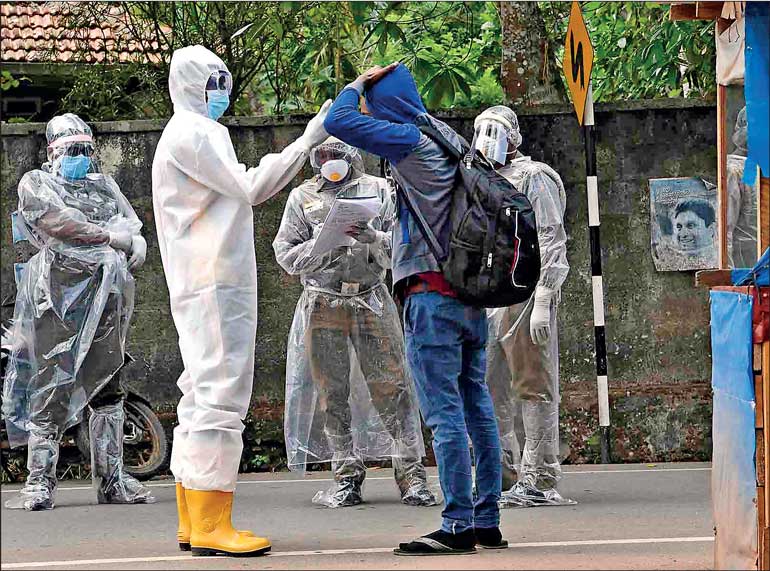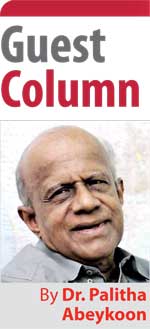Monday Feb 16, 2026
Monday Feb 16, 2026
Wednesday, 21 September 2022 00:10 - - {{hitsCtrl.values.hits}}

Only with widespread and strong support can the world ensure that an accord that can help prevent, prepare for and respond to future pandemics is agreed on – Pic by Shehan Gunasekara
 Governments of the world are currently working together to negotiate an international accord to improve the prevention of, preparedness for and response to pandemics. An accord which can protect and improve the health of people the world over, beyond the bounds of infectious disease.
Governments of the world are currently working together to negotiate an international accord to improve the prevention of, preparedness for and response to pandemics. An accord which can protect and improve the health of people the world over, beyond the bounds of infectious disease.
Born from the experiences of the COVID-19 pandemic, such an accord would be historic. In the 70+ years that the World Health Organisation has existed, only two legally binding instruments – the International Health Regulations and the WHO Framework Convention on Tobacco Control – have been established in the service of protecting the world’s health. COVID-19 – and the fact that we know that the next dangerous pathogen to emerge is not a question of if, but when – has shown the necessity of a new legally binding international instrument to better protect the world against the next pandemic threat.
And on this occasion, even the manner in which the accord is being developed is historic. The intergovernmental negotiating process to consider an accord stands out for having been so global and so transparent, designed to engage members of the public and other stakeholders around the world in its development.
The Intergovernmental Negotiating Body (INB), established by countries – WHO’s Member States – to draft and negotiate the accord, held its first meeting in February 2022. Following that, the INB’s immediate next step was to have the WHO Secretariat conduct public hearings. The INB then held a second meeting in July, a large portion of which was broadcast for public viewing, and an even-more-wide-ranging second series of public consultations will now be conducted through September.
Three sets of consultations are currently taking place.
First, Member States and relevant stakeholders are being invited to provide written inputs to the working draft of an accord by 15 September 2022. Sri Lanka has been a part of these consultations.
Second, the INB process is being discussed in depth by ministries of health at the annual meetings of each of WHO’s Six Regions, which began in August and continue to late October. This happened in Bhutan just last week for our South East Asia Region.
And thirdly, the WHO Secretariat will hold a second round of public hearings on 29-30 September, providing anyone interested in the process the chance to submit video or written statements. Governments are determined to do everything possible to consider all points of view from around the world before the production of the “conceptual zero draft” of the accord, to be presented to WHO Member States at the third meeting of the INB, in December. The other interested parties are free to submit their inputs to make this a truly representative outcome.
Such an accord – to be considered for adoption at the 2024 World Health Assembly – would be monumental.
It has the potential to offer a once-in-a-generation opportunity to protect current and future populations from a repeat of the COVID-19 pandemic. A pandemic accord would be an agreement between sovereign countries to commit to work together in preparing for and responding to the next pandemic or a next big health emergency. It’s about sharing responsibility for the health of everybody on the planet. Any new pandemic accord, if and when agreed, would be determined by governments themselves, as sovereign nations, who would take any action while considering their own national laws and regulations.
Many have already spoken of how necessary it is to have all parties’ inputs. We are grateful for, and need, leadership and public support for a new accord at all levels of society and government. Only with widespread and strong support can the world ensure that an accord that can help prevent, prepare for and respond to future pandemics is agreed on. I believe any such accord should give people the world over confidence in the fact that they are better protected from the next pandemic threat than they were from COVID-19.
And make no mistake, everyone would benefit from such an accord. With effective prevention, preparedness and response, we can avoid unnecessarily impinging on people’s freedom to travel, work, seek education and, above all, lead a healthy life free of avoidable disease. Our aim is to avoid a repeat of COVID-19 when the next pandemic threat comes knocking, including the tragic milestone of over 1 million deaths in this year alone.
We are witnessing history play out. A historic response to a historic emergency is only just. The lives of so many people have been affected by the COVID-19 pandemic that we have a unique responsibility to prevent a repeat of such a crisis.
This is a win-win situation for the world and we must take advantage of it.
(The writer is the WHO Director General’s Special Envoy for COVID-19.)